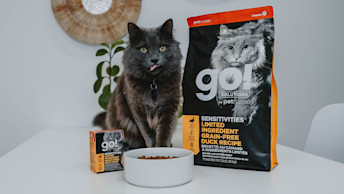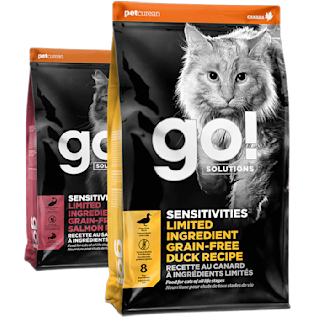August 12, 2024
Cat Food Allergies & Adverse Food Reactions

Navigating through the complexity of adverse food reactions in cats can be an overwhelming process for any pet parent. Understanding that your purring friend is reacting negatively to specific ingredients in their diet can provoke worry and confusion.
Adverse food reactions in cats are when the body inappropriately responds to a food component. This broad term includes both cat food allergies and food intolerances. While allergies involve the immune system reacting to a food component, intolerances are more common and do not involve an immune response.
Most food allergens are proteins, but many components can trigger an adverse food reaction, so identifying the offending ingredient can be very challenging.
Thankfully, true cat food allergies are rare, with food sensitivities being more prevalent but typically less severe. These sensitivities can manifest as digestive issues, chronic ear infections, and skin discomfort. Through dietary management or alternative treatments recommended by your vet, managing your cat's food sensitivities begins with identifying problematic ingredients or allergens.
Common Cat Food Allergens
An allergen is a substance that produces a reaction, this is true for both cat food allergies and sensitivities. Some of the most common allergens found in cat food that may trigger a reaction in cats include:
Beef - One of the most common food allergens for cats. Many cats experience a sensitivity to beef protein1.
Chicken – A common source of protein in cat food and a common allergen1.
Dairy Products – Contrary to what you see in cartoons, many cats are lactose intolerant and may react to milk, cheese, and other dairy products1.
Fish - A traditional part of cat diets yet a potential source of allergens1.
Cat Food Allergy Symptoms + Adverse Food Reactions
The symptoms of food sensitivities and intolerances can vary and if left untreated, the adverse food reaction may progress to a true food allergy and in extreme cases, potentially the development of irritable bowel disease.
Some common symptoms of adverse food reactions include:
Itchy skin - This is one of the most common symptoms of food allergies in cats1. Cats with food intolerances often excessively lick, bite, or scratch at their skin, leading to hair loss, redness, and sores. The itching and irritation is usually focused on the face, head, ears, belly, and feet1.
Gastrointestinal issues - Food sensitivities can also cause vomiting, diarrhea, and other gastrointestinal problems in cats1.
Skin infections - The excessive scratching and licking from food intolerances can lead to secondary skin infections in cats2.
Hair loss - The intense itching and licking from allergies can cause hair loss and bald patches in your cat’s coat1.
Observing when these symptoms occur can help differentiate between reactions to food or an environmental allergy or other types of allergies.
Diagnosing Cat Food Sensitivities
Determining if a cat has a food intolerance can be challenging, as the symptoms often mimic other conditions like flea allergies or atopic dermatitis. However, there are a few ways vets can diagnose food sensitivities in cats:
Elimination Diet
An elimination diet is the gold standard for diagnosing adverse food reactions in cats. This often involves feeding the cat a limited ingredient diet featuring a novel protein. The diet should contain a protein they have never eaten before, such as kangaroo, duck, or venison.
All table scraps, flavored medications, chews, and treats are also eliminated. If the cat's symptoms dramatically improve after 6-10 weeks on the elimination diet, it confirms a food intolerance.
To truly diagnose, the suspected allergen should be reintroduced to confirm it is indeed the culprit, however this step is sometimes skipped if a pet has drastically improved.
Blood Tests
Blood tests look for the presence of allergen-specific antibodies produced by the immune system. However, these results can often produce false positives. Blood tests are more useful for ruling out other causes of symptoms.
Skin Tests
Skin tests are considered the second-best diagnostic tool after elimination diets. They involve injecting suspected allergens like beef, dairy, or chicken into the cat's skin and looking for a reaction. However, skin testing for food allergies in pets is still being perfected, and has some limitations.
While diagnosing food sensitivities in cats can be tricky, an elimination diet trial lasting at least 10 weeks (about 2 months) is the the gold standard for identifying the offending allergen. Working closely with your vet and monitoring your cat's response to dietary changes is key.
What to Feed a Cat with Food Sensitivities
The most common treatment for cat food intolerances is switching to a novel protein or limited ingredient diet designed for cats with food sensitivities. This involves feeding your cat a novel protein and carbohydrate source that they've never eaten before.
Some novel protein options include:
- Insect
- Duck
- Pollock
- Salmon
- Venison
- Alligator
The most important thing is to completely eliminate any triggering ingredients from your cat's diet. Keep in mind it may take 8-12 weeks on the new diet to see improvement as your cat's body detoxes. Work closely with your vet to find a hypoallergenic diet and treatment plan for your individual cat.

Recommended Solution
Expertly Crafted Limited Ingredient Cat Food
If your cat has food allergies or intolerances, feeding a premium-quality cat food may be the solution. Go! Sensitivities is the ideal cat food for sensitive stomachs, with a single animal protein source and limited ingredients.
Sensitivities cat food
Conclusion
Cat food allergies and intolerance don't have to compromise your cat's quality of life. Symptoms of food sensitivities in cats can include itchy skin, ear infections, vomiting, and diarrhea. To diagnose a cat food allergy or intolerance, reach out to your vet to discuss an elimination diet trial.
Look for limited ingredient cat foods made with novel protein sources, and avoid common allergens like beef, chicken, and dairy. With the right diet, cats with food allergies and sensitivities can find relief from their symptoms and live happy, healthy lives.
"Cutaneous Food Allergy in Animals." Merck Veterinary Manual. Accessed July 16, 2024. https://www.merckvetmanual.com/integumentary-system/food-allergy/cutaneous-food-allergy-in-animals.
“Food Allergies in Cats.” VCA Animal Hospitals. Accessed July 16, 2024. https://vcacanada.com/know-your-pet/food-allergies-in-cats.



